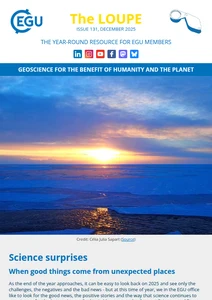President: Kristen Cook
(Emailgm@egu.eu)
Deputy President: Matteo Spagnolo
(Email)
ECS Representative: Rachel Oien
(Emailecs-gm@egu.eu)
Geomorphology is the scientific study of land-surface features and the dynamic processes that shape them. Besides focusing on the diverse physical landscapes of the Earth, geomorphologists also study surfaces of other planets. Understanding landform history and dynamics, and predicting future changes through a combination of field observations, physical experiments, and numerical modelling is at the heart of geomorphology. The division brings together research on processes that build topography trough e.g. the effects of tectonic forces as well as processes that modify the terrain such as weathering, erosion through running water, waves, glacial ice, wind and gravitational forces. Division members also study the impact of humans on geomorphological processes and investigate how geomorphological knowledge can be applied to solve problems of relevance to societies.
Latest posts from the GM blog
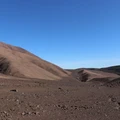
Highlighting: Strike-Slip Faults! (Interview with Tamara Aránguiz-Rago)
This blog post is part of our series: “Highlights” for which we’re accepting contributions! Please contact Emma Lodes (GM blog editor, elodes@asu.edu), if you’d like to contribute on this topic or others. Interview with Tamara Aránguiz-Rago, PhD student, University of Washington. Email: tarangui@uw.edu. Can you describe in simple terms how strike-slip faults work? Strike-slip faults are fractures in the Earth’s crust where blocks of land slide past one another horizontally. When these fractures cut through the entire lithosphere, they become …
Read more
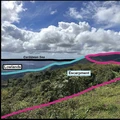
Highlighting: Puerto Rico, Part 2!
This blog post is part of our series: “Highlights” for which we’re accepting contributions! Please contact Emma Lodes (GM blog editor, elodes@asu.edu), if you’d like to contribute on this topic or others. Interview with Kate Drobnich, PhD student, Department of Geosciences, Colorado State University. Email: kate.drobnich@colostate.edu. Questions by Emma Lodes. Can you briefly describe the main objective of your research on Puerto Rico? I am working on a topographic escarpment in Puerto Rico to determine the roll of sediment caliber …
Read more
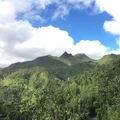
Highlighting: Puerto Rico, Part 1!
This blog post is part of our series: “Highlights” for which we’re accepting contributions! Please contact Emma Lodes (GM blog editor, elodes@asu.edu), if you’d like to contribute on this topic or others. Interview with Angus Moore, Researcher at the Czech Academy of Sciences, Prague, Czechia. Email: angus.moore@uclouvain.be Questions by Emma Lodes. Can you briefly describe the main objective of your research on Puerto Rico? The main objective of our research on Puerto Rico was to understand the factors controlling chemical …
Read more
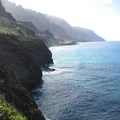
Highlighting: Volcanic Islands! (Interview with Kim Huppert)
This blog post is part of our series: “Highlights” for which we’re accepting contributions! Please contact Emma Lodes (GM blog editor, elodes@asu.edu), if you’d like to contribute on this topic or others. Interview with Kim Huppert, Assistant Professor of Earth and Atmospheric Sciences, City College of New York and Graduate Center CUNY. Email: khuppert@ccny.cuny.edu, website: https://sites.google.com/view/huppert-ccny-esd Questions by Emma Lodes. What is most interesting or exciting to you about the geomorphology of volcanic islands? Where to start! I think volcanic …
Read more
Recent awardees

- 2025
- Ralph Alger Bagnold Medal
The 2025 Ralph Alger Bagnold Medal is awarded to
Christopher D. Clark for fundamentally advancing the understanding of glacial landscapes, landforms, and geomorphological processes.
Read more
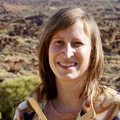
- 2025
- Division Outstanding Early Career Scientist Award
The 2025 Division Outstanding Early Career Scientist Award is awarded to
Jana Eichel for outstanding and innovative work on the feedbacks between plants and geomorphic processes in high mountains.
Read more

- 2025
- Outstanding Student and PhD candidate Presentation (OSPP) Award
The 2025 Outstanding Student and PhD candidate Presentation (OSPP) Award is awarded to
Jil van Etten Periglacial puzzles: Unravelling environmental controls on solifluction lobe morphometry
Read more

- 2025
- Outstanding Student and PhD candidate Presentation (OSPP) Award
The 2025 Outstanding Student and PhD candidate Presentation (OSPP) Award is awarded to
Jonah McLeod Planform as a Dominant Control on Sediment Intermittency: Global Analysis of River Transport Patterns
Read more

- 2025
- Outstanding Student and PhD candidate Presentation (OSPP) Award
The 2025 Outstanding Student and PhD candidate Presentation (OSPP) Award is awarded to
Leona Repnik Historical photogrammetry for DoDs in deglaciating environments: challenges and opportunities
Read more
Current issue of the EGU newsletter
In our December Issue we we are focusing on positive stories of surprises in science. Asmae Ourkiya shared how a prize established in 1900 to reward anyone making contact with alien life (expect Martians) ended up funding more than a century of astronomy research and innovation. Guest blogger Fernanda Matos described the discovery her autism had been driving her interest in Oceanography for years, in her blog on how we can better support people with disability in geoscience. And we highlight some surprises to avoid in our blog on the Austrian visa and Schengen system ahead of EGU26. Also catch up on all the upcoming dates for webinars and funding, including €10,000 to host a Geoscience Day event in your European country, and share your opinions on where EGU should be focusing strategically in the next 5 years in the EGU Members' Survey.
All this and much more, in this month's Loupe!
Read more










